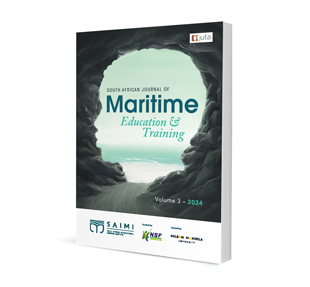
Decarbonisation in Shipping and Maritime Innovation Call for Readiness in Maritime Education and Skills Training in South Africa
Author: Moctar Doucouré
ISSN: 2790-783X
Affiliations: South African International Maritime Institute (SAIMI), Nelson Mandela University, Gqeberha, South Africa
Source: South African Journal of Maritime Education and Training, Volume 3 Issue 1, p. 31-38
https://doi.org/10.47348/SAJMET/2024/i1a3
Abstract
South Africa is a country lacking sufficiently mature readiness regarding the technology environment and business activeness visioned for a future low-emission economy. This lack of readiness is also reflected in the current maritime education and skills training at various levels, which is mostly focused on conventional seafarer programmes, and knowledge of socioeconomic and economic aspects of marine and maritime affairs. Maritime transport plays a central role in global supply chains and many industries will use the shipping sector to facilitate their net zero goals. The industry’s biggest challenge transitioning into a low-emission economy is the International Maritime Organization’s decarbonisation targets associated with greenhouse gas emissions. Critical to decarbonisation in maritime transport is the increasing use of green energy-based fuel such as ammonia converted from hydrogen, which can be used in ship engines directly as fuel. In this regard, ports play a critical role in the hydrogen pipeline. Apart from clean energy, trends and innovation in the maritime transport-related economy include artificial intelligence, maritime robotics, maritime internet of things, big data and analytics, immersive reality and cybersecurity. The integration of the IoT, in particular, simplifies location data acquisition while enabling tracking of various other parameters such as emissions, machine conditions and propulsion data. Trends and innovation in maritime transport clearly call for new skills in the use of digital systems and shipping automation. Upstream the skills pipeline, curriculum changes should be implemented, together with agile, rapid and effective approaches to maritime education and training. Such an approach is virtual mentored learning or VML, enabling content dissemination and simulation/experiential-learning, irrespective of location. This will significantly alleviate constraints in the availability of qualified teaching staff by means of e-based expert participation.